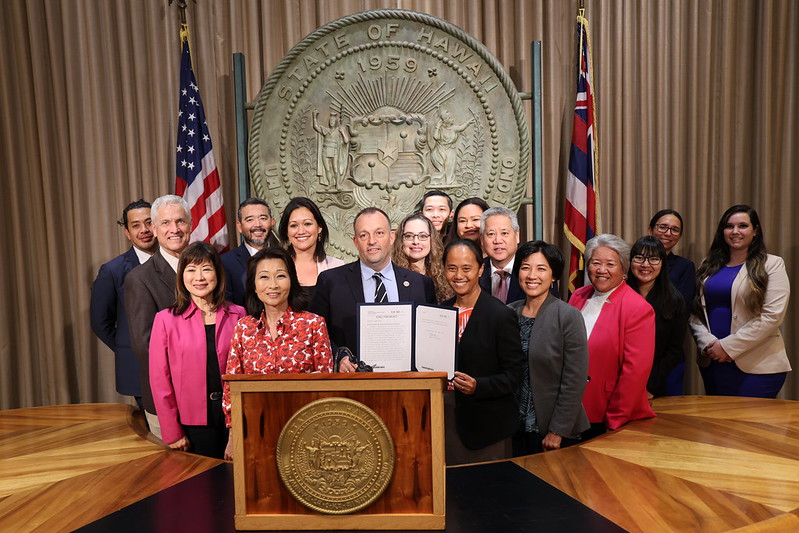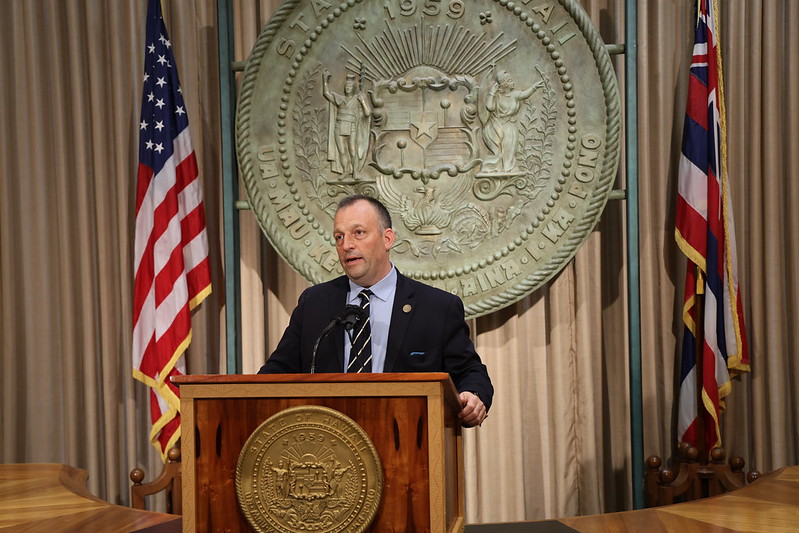Gov. Green signs first bills into law — about felony prosecutions, reproductive rights

Hawaiʻi Gov. Josh Green on Wednesday signed his first two bills into law, codifying conditions under which felony prosecutions can be initiated within the State of Hawai‘i and providing stronger, clearer protections and better access for reproductive health care services.
Senate Bill 36 amends state law to allow county prosecutors to initiate felony cases by complaints following preliminary hearings and not just by grand jury indictment. It also prohibits multiple attempts to initiate a felony prosecution for an offense, except in certain circumstances.
The amendment resolves an issue resulting from the Hawai‘i Supreme Court decision on Sept. 8, 2022 in State v. Obrero, in which the court ruled that HRS 801-1 did not permit initiation of felony criminal charges via a preliminary hearing. The ruling came despite active use of the process since 1982, when voters approved it.
A subsection of the bill limits the prosecution to one attempt to charge a felony case via grand jury indictment or complaint following a preliminary hearing unless certain conditions are met, including presentation of additional material evidence, evidence of misconduct by the grand jury or grand jury counsel, or if a court finds good cause to allow another attempt.
“The people of Hawai‘i want to feel safe in their homes and communities and have every right to expect government leaders to provide public safety,” Green said in a press release. “This legislation is a tool that will help our law enforcement officers and county prosecutors continue their work toward that goal.”
Also making remarks at the ceremony were Oʻahu Sen. Karl Rhoads, Chair of the Senate Committee on Judiciary, Big Island Rep. David Tarnas, Chair of the House Committee on Judiciary & Hawaiian Affairs, and City and County of Honolulu Prosecuting Attorney Steven Alm. To watch the signing ceremony, click here.
Senate Bill 1 advances Hawai‘i’s long and proud civil rights history. The new law expands access to reproductive health care services in numerous ways; clarifies the state will not deny or interfere with a pregnant person’s right to choose to terminate a pregnancy; and protects Hawai‘i health care providers from punitive legal action from within or outside of the state relating to the provision of legally provided reproductive health care services. Additional protections, prohibitions and requirements are included.
“This is one of the most important issues of our time and as Hawai‘i’s physician-governor, I tell you absolutely that this goes beyond a complex social issue for political discussion,” Green said. “This is 100 percent about fundamental, practical health care for our people.
Also making remarks at the signing ceremony were: Lt. Governor Sylvia Luke, Big Island Sen. Joy San Buenaventura, Chair of the Senate Committee on Health and Human Services, and Kauaʻi Rep. Nadine Nakamura. Both lawmakers are members of the Women’s Legislative Caucus. To watch the ceremony, click here.
Hawai‘i’s first civil rights protections against discrimination date back to pre-statehood days, when territorial lawmakers at the Constitutional Convention of 1950 first ratified what is now an article in the state Constitution: Art. I § 5. It states that no person “shall be denied the enjoyment of the person’s civil rights or be discriminated against in the exercise thereof because of race, religion, sex or ancestry.”
Hawai‘i was the first state to ratify the Equal Rights Amendment, to recognize a woman’s right to choose, and to seriously address same-sex marriage.
Abortion has again risen to the forefront since the 2022 U.S. Supreme Court decision in Dobbs v. Jackson Woman’s Health Organization that overturned Roe v. Wade. “Roe” was a 1973 Supreme Court decision that decriminalized abortion and protected the right to access the procedure legally across the country.









